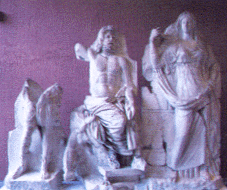AEGEAN REGION MUSEUMS
The Museum List
- Ethnography Museum
- The Ataturk Museum
- Fine Arts Museum
- Seljuk Yasar Art Museum
- Natural History Museum
- Odemis Archeological Museum
- Tire Archeological Museum
- Canakkale Archeological Museum
- The Kutahya Archeological Museum
- The Kossuth House Museum
- Manisa Archeological Museum
- The Archeology Museum (Usak)
- The Kaftanci House Museum
- The Ataturk Ethnography Museum (Usak)
- The Open – Air Museum (Acik Hava Muzesi) (Dinar)
- The Archeological Museum (Ephesus)
- Turkish Bath Museum
- The TCDD Open-air Steam Locomotives Museum
- The Ataturk Ethnography Museum (Denizli)
- Turolian Park, Open Air Museum
- Bodrum Archeological Museum
The Archeological Museum, near Konak Square, houses a superb collection of antiquities including the statues of Poseidon and Demeter which, in ancient times, stood in the Agora. (Closed on Mondays)

Poseidon and Demeter, Izmir Archeology Museum
Next to the Archeology Museum, the Ethnography Museum contains folkloric artifacts, which include a fine collection of Bergama and Gordes carpets, traditional costumes and camel bridles. (Closed on Mondays).
The Ataturk Museum is situated on Ataturk Caddesi in an old Izmir house used by the founder of the Turkish Republic. It exhibits photographs of the leader as well as some of his personal effects. (Closed on Mondays).
The Fine Arts Museum, located in Konak, displays the works of famous Turkish painters. (Closed on Mondays).
The Seljuk Yasar Art Museum is a private museum on Cumhuriyet Bulvari with a collection of 20th-century Turkish art. (Closed on Sundays).
The Natural History Museum in Bornova acts as a natural reserve of the Aegean Region landscapes’ historical preservation. (Closed on Sundays).
The Odemis Archeological Museum is about 60 km east of Izmir and displays regional artifacts. (Closed on weekends).
The Tire Archeological Museum is about 50 km east of Izmir. (Closed on weekends).
Hotels, restaurants and cafes along the traffic in the harbor of Cannakkale Strait offer a view ofThe Canakkale Archeological Museum.
The Kutahya Archeological Museum was a medrese in the 14th century that now displays ethnographia, Roman and Byzantine relics, and Iznik and Kutahya tiles / porcelains from the Ottoman times.

Ceramic Fountain, Kutahya
Lajos Kossuth, the 19th – century Hungarian hero, lived with his family in what is now the Kossuth House Museum where relics and documents related to Kossuth are now displayed.
The adjacent medrese or theological college to Muradiye Mosque in Manisa, today housesThe Manisa Archeological Museum.
Historically, Usak was an important carpet weaving center and tourists find The Archeology Museum informative and interesting. The Kaftanci House Museum, together with The Ataturk Ethnography Museum, displays wonderful Usak carpets and kilims in Ataturk’s former residence.
The Open-air Museum (Acik Hava Muzesi) is near the north entrance of the town of Dinar, 100km south of Afyon.
The Archeology Museum houses an impressive collection of statues and other finds recovered during th excavations at Ephesus.
Turkish Bath Museum, in a building from the 16th century, shows Turkish life at the hamam (bath).
Near Seljuk is a TCDD Open-air Steam Locomotives Museum displaying historical train cars in Camlik.
The Ataturk Ethnography Museum in the city center displays folk art and ethnic artifacts.
In the village of Ozluce, a veritable-Open-air-museum east of Mugla, is Turolian Park, where you can fid fossils that geologists claim are 5 – 9 million years old.
Bodrum Archeological Museum houses artifacts and remains that date as far back as the Bronze Age.



